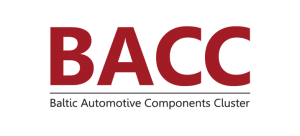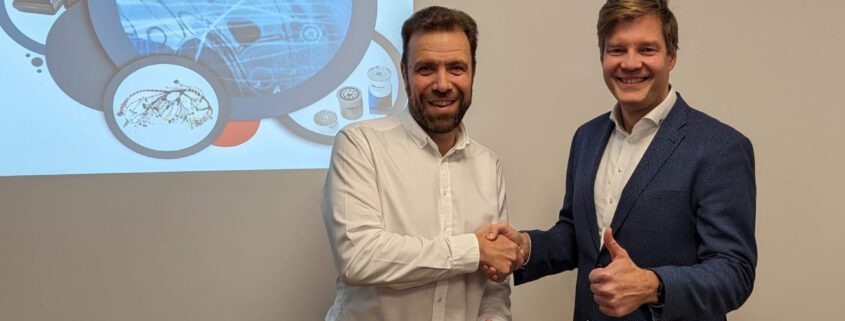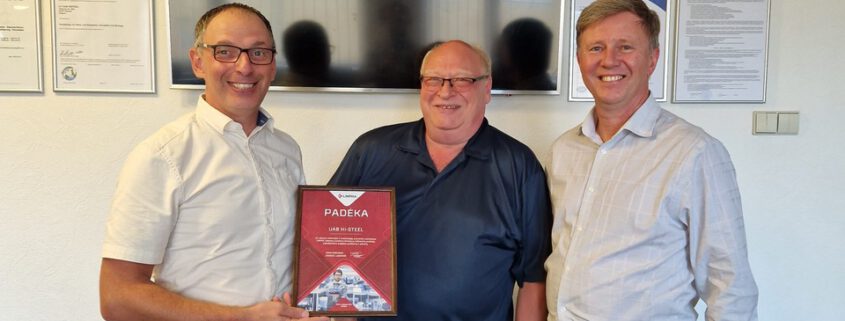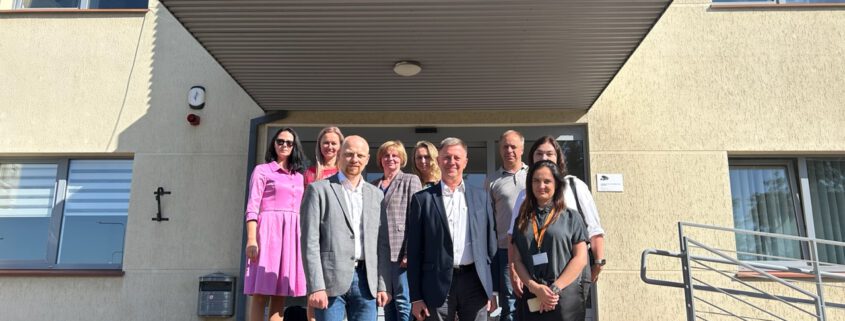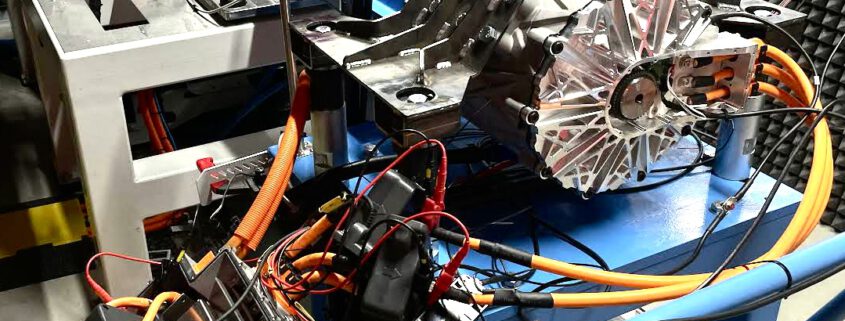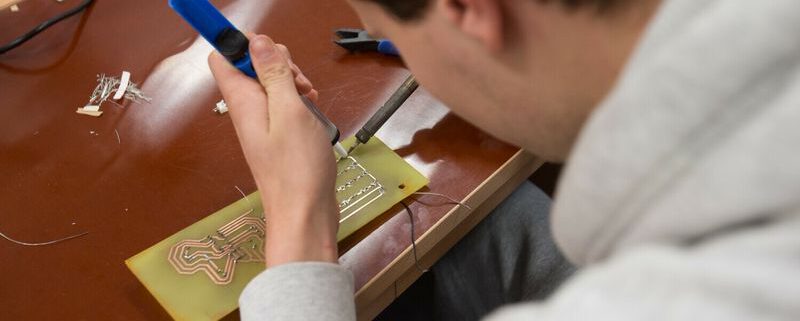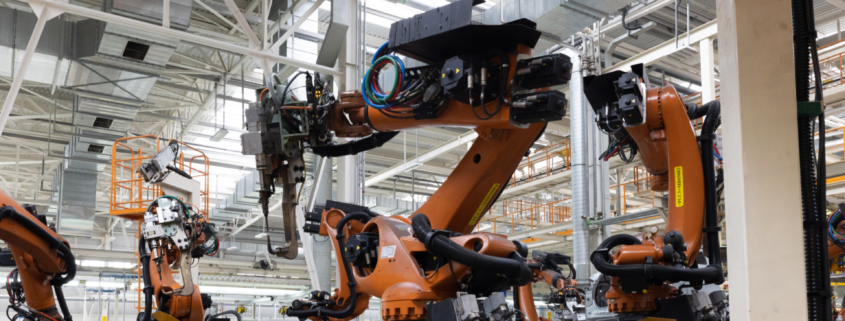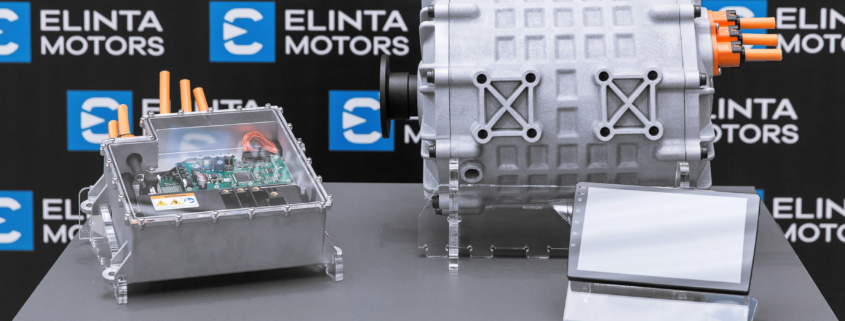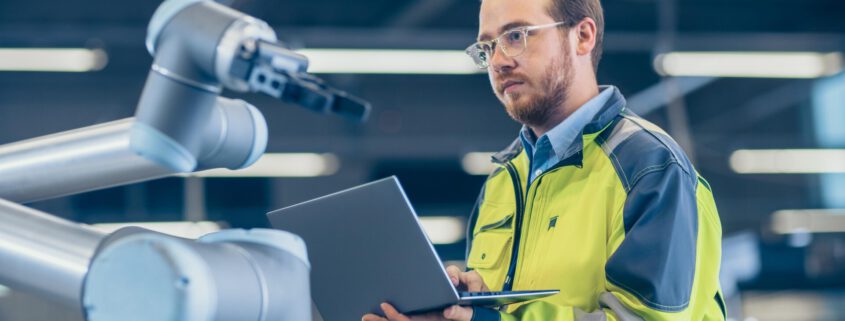Thanks to the resourceful hosts Vytautas Jokuzis, PhD and Laurynas Jokuzis for the hospitality, interesting presentation and tour of Elinta Motors and other Elinta Group companies.
We are glad that the automotive sector in Lithuania operates successfully and we congratulate Maxim Zakletski, the CEO of Hella Lithuania, on joining the BACC Board.
We thank Aleksandras Izgorodinas for his excellent overview of the economic situation and forecasts.
In Spring, the Lithuanian Engineering and Technology Industry Association LINPRA, (BACC is a member of this organisation) invited 5-8 gr. and 9-12 gr. students to the National Young Engineers Championship. The Championship was held in 6 cities and received a lot of attention from young talents. Participants had to create a working Goldberg machine by integrating engineering solutions.
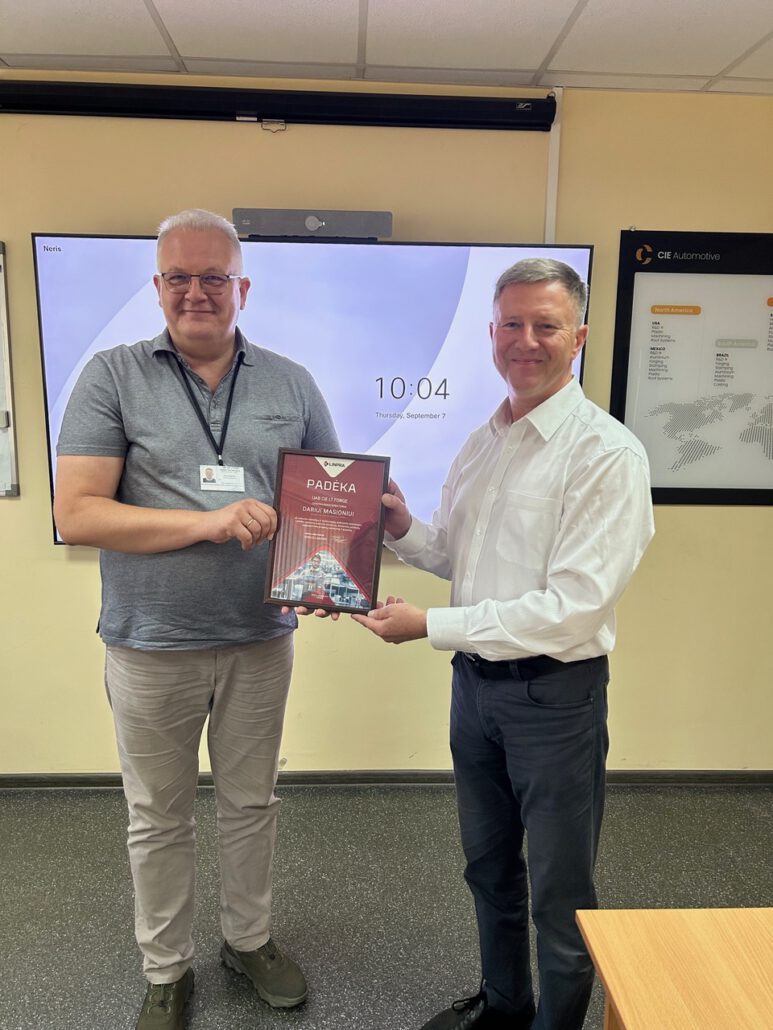
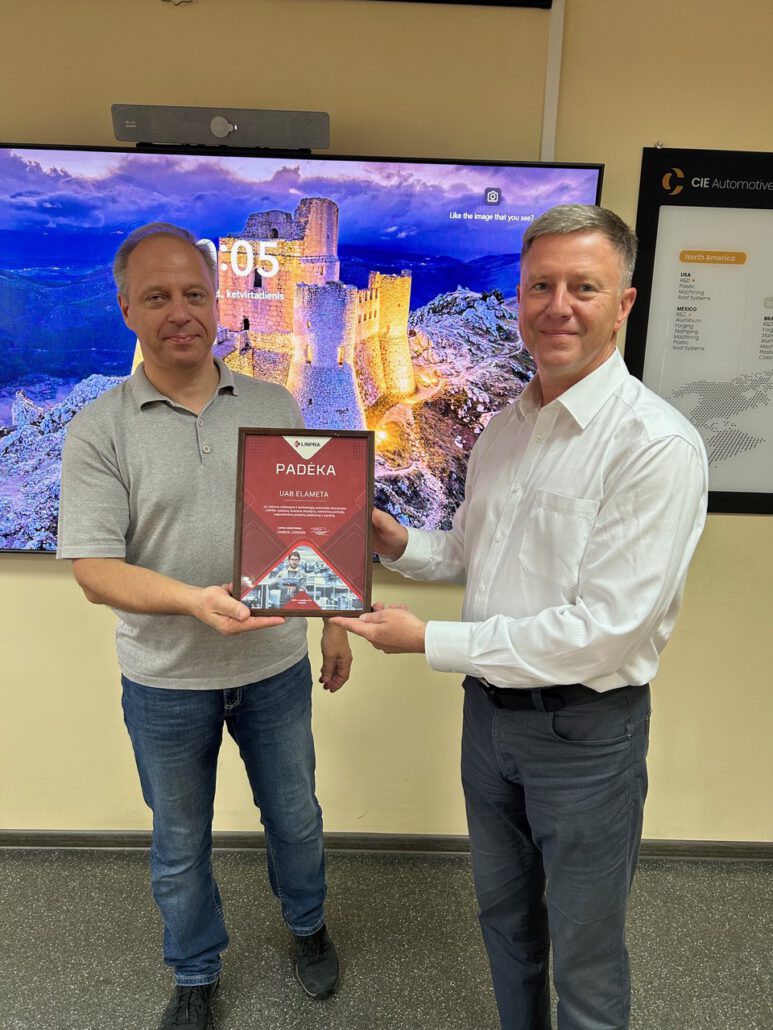
On 9th September Purchasing Managers of BACC companies – members had an Experience Exchange Forum in CIE LT Forge factory in Marijampole.
All the participants shared their experience about the current market situation, challenges and discussed the tactics used in the negotiation process. It is planned to organise the second BACC Purchasing Managers Experience Exchange Forum at the end of Autumn. The topics which will be analyzed:
– surplus of raw materials in warehouses,
– lack of suppliers,
– prices of raw materials/services
– long-term contracts – is it a good time to sign or not
– delivery terms and conditions.
“Special Thanks” to the CIE LT Forge company. Purchasing managers were welcomed with so nice attention!
If we cooperate and share our experience, we will achieve better results!
Elinta Motors, UAB is currently testing the EPM32.200 engine (third generation), with EDS33.800 SiC controller. It is a particularly progressive technology.
The main advantages:
– high voltage, 800 V system;
– the ability to adapt/use to cars up to 20 tons;
– the engine does not use permanent magnets.
The serial production of the new engine EPM32.200 is planned at the beginning of 2024.
The company is constantly developing, improving and producing various prototypes in cooperation with future manufacturers, so inventions are successfully applied in practice.
We are happy for developpers and engineers of “Elinta Motors” who have the highest competence in creating innovative solutions!
This month, thousands of school-leavers will take their examinations and apply to institutions of higher education and other educational institutions. Are we again going to see large numbers applying for specialities with the lowest demand in the job market? Are we again going to have a situation where youth starts out on its career and business talks about the lack of specialists, and neither youth nor business hears each other? And after all, what specialities should school-leavers choose, so that their future prospects would be clear and the job market would make them offers even before they complete their studies?
One of the fastest-growing sectors with the most hunger for new employees in Lithuania today is the automotive components industry. Participants in the automotive sector in Lithuania were growing and making positive forecasts even when other sectors were slowing down or declining. Just in 2022 alone, automotive sector companies in Lithuania created more than 2,000 jobs, and they intend to maintain this tempo both this year and next year. Members are looking for hundreds of people with the skills and abilities needed to work in the automotive sector in Lithuania, but are encountering a critical lack of specialists. The further development of the automotive industry today depends on finding specialists in engineering, automation, robotics and mechatronics. Despite the fact that state-funded seats at educational institutions have been strategically allocated to these specialities for years, the available seats in study programmes have not been filled.
We are rapidly advancing into Industry 4.0
Because Lithuania is quickly catching up to other economically strong countries in Europe, for some time now manufacturers have not seen Lithuania as a cheap-labour location. To remain competitive, automotive industry companies have been investing in robotics, automation and other productivity-enhancing measures. But the skilled personnel able to turn these intentions and visions into reality is in short supply.
Industry especially lacks qualified specialists able to supervise the work of robots, or to create and adapt modern automation solutions, artificial intelligence and electronic sensors. There are such specialists, and they will only become even more essential as Lithuania’s industry grows and develops.
Autonomous driving technologies
Lithuania, and especially the Kaunas region, is becoming a centre for autonomous driving technologies. Automotive electronics manufacturers located in Kaunas, including Continental, Hella and Littelfuse, make the most advanced radar systems enabling autonomous driving functions in the latest vehicles. The companies have announced optimistic plans for future development, but even today they are encountering problems with finding enough specialists. It is forecast that if the development plans were realised, the demand for engineers in the job market would exceed supply by 4 to 5 times.
Companies most lack process engineers, quality engineers, test engineers and maintenance engineers. This kind of work can usually be done by specialists who have completed studies in automotive engineering, electronics engineering or industrial engineering. Companies also have a difficult time finding embedded systems programmers. The demand for the specialists listed here is so great that today it is quite common for students studying in these programmes to receive their first job offers while they are still in their third or even second year of study.
But what can school-leavers do if they can’t study or don’t want to study in a university?
The automotive and other manufacturing sectors are experiencing a critical shortage of qualified technicians. A person who has completed mechatronics, electronic equipment or similar training can work as a technician. Without qualified technicians, no large manufacturer of automotive components can achieve its plans for growth because it will lack the specialists needed to supervise the production process. Companies usually have dozens of open positions for these specialists, and that situation will not change in the next several years.
The members of the Baltic Automotive Components Cluster enthusiastically invite and encourage young people to visit and see for themselves the automotive sector. It is only by ourselves contributing to growing and developing young talent that we will create the proper ecosystem and ensure the sustainable development of our companies, so I call on other companies to join these initiatives.
*****
Give this message to the pupils around you. So that young people could choose wisely and strategically, with an eye on the future – to grow in those sectors where the country’s economy is growing, where in just a few short years today’s school-leavers will become active participants.
Representatives of companies in the automotive industry in Lithuania say that at least for now, there are very few domestic suppliers able to serve them, and this prevents the sector from being more competitive.
According to Giedrius Valuckas, Chairman of the Board of the Baltic Automotive Components Cluster (BACC), the ecosystem of the automotive sector in Lithuania remains incomplete, so a majority of contractors and suppliers have to be hired abroad.
“To ensure further development, we have to solve the problem of the shortage of suppliers. In countries where the automotive industry has been developed for decades, such as Germany and Romania, the automobile industry now has a strong ecosystem surrounding it, where there is a reliable supplier for every part or service. We especially lack suppliers and servicers who can install and maintain production lines, as well as companies providing automation and robotic integration solutions, including the equipment itself and services for its maintenance and programming,” says Valuckas.
The automotive industry is strictly regulated, so manufacturers as well as suppliers have to meet specialised requirements. Rytis Bortkevičius, Maintenance Department Manager at CIE LT Forge, a maker of forged and machined parts for the automotive industry, says that due to the shortage of local suppliers and service providers, the company has decided not to proceed with some projects. The company sees the greatest shortage of suppliers in the areas of machining and cooling equipment servicing.
Additional logistical burden
Lithuanian companies in the automotive industry mostly cooperate with suppliers in Germany, Romania, Hungary and China.
“It’s only natural that most suppliers are from countries where the automobile sector is very strong and has been operating for many years. But at the same time, we see that Romania and Hungary can offer more competitive finished-product prices because the supplier ecosystem in those countries is more developed, so the supply chain is shorter and more efficient,” says Valuckas.
Aidas Andziulis, Head of Purchasing at Continental in Lithuania, agrees. According to Andziulis, costs significantly increase due to the additional logistical burden.
“If we have to order a service from a provider in Germany, while the Romanians can use a local provider, then our product automatically becomes 30–40% more expensive,” says Andziulis.
In Lithuania, suppliers simply lack experience working with the automotive industry.
“Companies often don’t even imagine that they could move their business in this direction, to offer services to companies in the automotive industry. The entire automotive ecosystem has to grow – only then will we have sustainable growth as a sector,” says Shayan Ali, Managing Director of Continental in Lithuania.
Maxim Zakletski, Managing Director of Hella Lithuania, holds a similar opinion.
According to him, there are suppliers in Lithuania, but so far they still are not at a level where they could supply components to automotive manufacturing companies.
“The automotive industry has set the bar for quality assurance very high indeed, and Lithuanian producers still need to reach a bit higher. Hella Lithuania as well as the other members of BACC are prepared to help companies meet the requirements. I think that for Lithuanian companies, that would be very helpful, and the benefits would be mutual,” says Zakletski.
About 15,000 employees work in Lithuania’s automotive industry companies, and the total annual turnover of the sector in 2021 amounted to €875 million.
The first half of the year is encouraging – the companies operating in the B2B segment are doing well, they have plenty of orders and they forecast growth, although it will likely be slower than in 2022. But there is considerable uncertainty regarding potential results for the second half of the year.
The reason for slower growth, according to Darius Lasionis, is that customers accumulated large inventories of components in their warehouses last year, so they must first use up the inventories they have. In addition, rising interest rates and more expensive loans are reducing companies’ appetite for risk when investing in technological renewal and expansion as well as reducing their willingness to purchase new products. All of this has an effect on corporate decisions and is setting the stage for more modest growth.
“But the overall image of the first half of the year for companies making electronic components, electronic equipment, machinery and devices, metal products and automotive components is largely positive,” says Lasionis.
Nevertheless, he warns that the situation is uncertain and companies should remain flexible, so they could adapt on short notice to a potentially fast-changing situation.
Liutauras Variakojis, Director of the Swedish-owned UAB “SLT Industrial Components” in Biržai, says that the company does not see a downturn; on the contrary, turnover is increasing. The company’s operations include three areas – packaging of sweets, components for medical devices, and automotive components. The company receives most of its orders for automotive components from Volvo.
“When we are constantly growing, a small slowdown in one of the operational areas is not painful. Let’s say that instead of three shifts, we began to work in two shifts, and when we get more orders, we hire more people,” he explains.
That the situation is not worsening is also shown by the fact that SLT Industrial Components is acquiring from “Šiaurės vilkas” the building of the former brewery “Astravas” and will relocate part of its production capacity, the packaging of sweets, to that building.
Will hire several hundred each year
“The forecasts of companies in our cluster are quite positive. Maybe the smaller companies are talking about modest growth or that they will try to maintain the turnover they had last year, but the larger companies are making significant investments into new products and services, and are planning to increase production,” says Giedrius Valuckas, Chairman of the Board of the Baltic Automotive Components Cluster (BACC).
According to him, although the volume of orders may fluctuate, the scales often tip toward an increase. And some factories are being forced to postpone or even turn down some orders, because they lack employees.
For example, the electronic components manufacturer Continental sees its future prospects quite optimistically and intends to further increase the number of employees by several hundred each year until it reaches its target of 1,500.
“I am pleased that we have already put together more than half of our team. We will continue to look for people, mostly for production positions – operators, warehouse workers, technicians. But we always need quality engineers, maintenance engineers and test engineers, and we will certainly continue to hire them, too,” says Shayan Ali, Managing Director of Continental in Lithuania.
His thoughts are echoed by representatives of AQ Wiring Systems, a maker of cable harnesses and electromechanical modules. They say that growth will not stop. The company, with 1,243 employees, is planning to hire an additional 150 this year.
Automotive parts maker UAB “Hella Lithuania” will also hire at least another 50 employees.
“We can take satisfaction not only in a record-breaking year, but also in the increasing motivation of job applicants, and we are getting more and more applicants who already have experience in the automotive industry. This year we also plan to hire engineers and quality specialists in a number of areas,” Maxim Zakletski, Managing Director of Hella Lithuania, is quoted in the announcement.
Companies producing components for cars, agricultural and construction equipment created more than 2,000 new jobs in 2022.
Valuckas believes that Lithuanian companies probably have no lack of orders thanks to the strong foundation they built in prior years, focusing on efficiency, digitisation and attracting talent. Because the European automotive industry’s moods can change quickly, order quantities are smaller and order delays are longer. And disrupted supply chains remain unstable and uncertain.
“However, the increasing number of employees shows that Lithuania’s companies have managed to avoid these problems,” he emphasises.
Elinta Motors, UAB became a Member of an active BACC community! CONGRATULATIONS!
Elinta Motors develops sustainable mobility solutions – traction systems and battery modules for the commercial transport. Currently, more than 23 mln. km have been driven with the systems developed by Elinta Motors all over the world! The company is located in the territory of the Kaunas FEZ where develops serial production of electric vehicles’ power systems. It is planned to produce up to 2,000 units per year.
We will all do more together!
The lack of qualified employees is a problem in the Lithuanian Automotive industry.
“The lack of quality, process and equipment maintenance engineers is felt the most. There is a critical lack of test engineers in the market – their demand already exceeds the supply, says Giedrius Valuckas, Chairman of the Board of the Baltic Automotive Components Cluster (BACC).
BACC member companies cooperate with educational institutions, appreciate the quality of studies and hope to achieve positive results in the near future.
Despite the lack of qualified specialists, the Automotive sector increased 20%, creating over 2,000 new jobs. This sector is working effectively and hope to achieve even better results!
Source: Verslo žinios
BACC member, CIE LT Forge, signed a contract with the Marijampole Vocational Training Center. CONGRATULATIONS!
The aim of cooperation is to encourage young people to choose professions related to metalworking and, possibly, to offer them a job in the company in the future.
We will minize the lack of qualified employees only by working together with Educational institutions.
